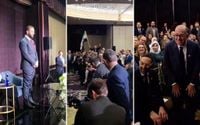For the first time in nearly six decades, a Syrian head of state has set foot in New York City to attend the United Nations General Assembly, marking a dramatic reentry for Syria onto the world stage. President Ahmad al-Sharaa’s arrival on Sunday, September 21, 2025, is not just symbolic—it signals a profound shift in the country’s political landscape following the ouster of the Assad family dynasty and the end of a brutal 14-year civil war.
Al-Sharaa’s visit is historic in every sense. The last Syrian president to address the UN General Assembly was Nur al-Din al-Atasi in June 1967, shortly after the Arab defeat in the Six-Day War. Since then, Syria has been defined by the iron-fisted rule of the Assad family, international isolation, and years of devastating conflict. That era ended in December 2024, when al-Sharaa, once known as Abu Mohammad al-Julani and the leader of Hayat Tahrir al-Sham, led a lightning insurgency that toppled Bashar Assad’s regime.
According to CBS News, al-Sharaa’s five-day visit includes high-level meetings with world leaders and a scheduled address to the General Assembly. He is accompanied by at least four ministers, underscoring the significance Damascus places on this diplomatic opening. On Sunday evening, he also met with members of the Syrian diaspora in the U.S., including Jewish community leaders—a gesture highlighting the government’s efforts to project a new, more inclusive image abroad.
The road to this moment has been anything but straightforward. Al-Sharaa’s past as the head of Hayat Tahrir al-Sham, a group once designated a terrorist organization by the United States, initially made Western officials wary. The U.S. government only removed his terrorist designation in July 2025. Yet, since assuming power, al-Sharaa has worked to reassure Syria’s minority communities and restore ties with both Arab neighbors and the West. His government, however, remains dogged by accusations of sectarian violence, including the deaths of more than 1,000 Alawites in the west in March and over 800 Druze in Suwayda Province in July, as reported by multiple sources including the Associated Press.
Sanctions relief is front and center on al-Sharaa’s agenda in New York. U.S. President Donald Trump, after meeting al-Sharaa in Riyadh on May 14, 2025, announced the lifting or waiving of a broad swathe of sanctions imposed under the Assad regime. Trump called al-Sharaa a “charismatic, strong, and resilient fighter,” and described the move as a “big step toward Syria.” Yet, the strictest sanctions—those under the Caesar Syria Civilian Protection Act, passed in 2019—can only be permanently removed by an act of Congress.
Al-Sharaa, in a preview interview with CBS’s 60 Minutes, did not mince words: “We must rebuild ties directly and properly. I hope to meet President Trump again to move this forward.” He warned that international hesitation over sanctions relief could “conspire in killing Syrians again by obstructing this decision.” The theme of sanctions—and their impact on Syria’s battered economy and infrastructure—has dominated his public statements and private meetings alike.
The diplomatic thaw is also playing out in Washington, D.C. On September 19, 2025, Syrian Foreign Minister Asaad Hassan al-Shibani raised the Syrian flag at the embassy in the U.S. capital for the first time in decades, a moment he described as “historic.” According to al-Ikhbariya, Shibani met with senior U.S. officials at the Departments of State and Treasury, as well as senators from both parties, including Lindsey Graham, Chris Van Hollen, Jeanne Shaheen, and James Risch. Discussions focused on sanctions relief, Syria’s reintegration into the global economy, and regional stability. Senator Shaheen stated, “The continuation of sanctions prevents the investments essential for reviving Syria’s economy and risks pushing the country back into conflict. Syria’s stability is vital to both regional and international security.”
There is bipartisan interest in Congress, with Representative Joe Wilson calling for a full repeal of the Caesar Act. Treasury officials, joined by U.S. Special Envoy to Syria Thomas Barrack, emphasized the need to reconnect Syria to the global financial system “in a responsible and secure manner,” while strengthening counterterrorism cooperation. Deputy Secretary of State Christopher Landau described the moment as “a historic opportunity for Syria to build a peaceful, prosperous, and sovereign state.”
Regional politics remain as complex as ever. Al-Sharaa has warned that failure to integrate the Syrian Democratic Forces (SDF) into the national army by year’s end could trigger Turkish intervention, accusing the SDF and Kurdistan Workers’ Party (PKK) of stalling a March 10 framework agreement. In an interview with Turkey’s Milliyet newspaper, he rejected federalism or decentralization, calling them “a cover for separatist ambitions.”
Relations with Israel are another flashpoint. Since Assad’s fall, Israel has seized a formerly UN-patrolled buffer zone in southern Syria and conducted hundreds of airstrikes on Syrian military sites. Negotiations are underway to revive the 1974 disengagement agreement, with al-Sharaa expressing hope for a deal “in a matter of days.” However, Israeli Prime Minister Benjamin Netanyahu, speaking on September 21, 2025, downplayed the chances, saying, “There is some progress but the deal is still a vision for the future.” Al-Sharaa has accused Israel of exploiting post-Assad instability to push for Syria’s partition, but insists that any agreement would be “in the interest of the Syrian people and to end Israeli aggression against Syria.”
Back home, Syria is preparing for its first parliamentary elections since Assad’s ouster, scheduled for October 5, 2025. The process will not be a direct popular vote; instead, two-thirds of the People’s Assembly will be chosen by electoral colleges in each province, and al-Sharaa will appoint the remaining third. Officials cite logistical challenges—including lost documentation and millions of refugees abroad—as reasons for not holding direct elections at this stage.
As Syria reemerges from the shadow of war and dictatorship, al-Sharaa’s presence in New York is both a dramatic diplomatic gesture and a test of whether the international community is ready to accept a new Syria. The raising of the Syrian flag in Washington, the flurry of high-level meetings, and the promise of elections all point to a nation eager to redefine itself. But with sectarian wounds still raw, sanctions relief uncertain, and regional rivalries simmering, the path ahead for Syria remains fraught with challenges—and opportunities.
For now, all eyes are on New York, where Syria’s new leader is making his case to the world, hoping that a nation long defined by conflict can find its way back into the fold of international diplomacy and stability.


